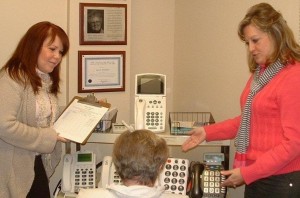 Independence is valued by people of varying ages and personal situations. Young people yearn for it, adults often take it for granted, and seniors sometimes lament its loss. Advocates for Access, a nonprofit organization, has as its mission statement “to empower people with disabilities to live independently in our community.” For people with disabilities, independence often requires considerable determination and planning. Located at 4450 N. Prospect Road, Suite C8 in Peoria, Advocates for Access is there to help.
Independence is valued by people of varying ages and personal situations. Young people yearn for it, adults often take it for granted, and seniors sometimes lament its loss. Advocates for Access, a nonprofit organization, has as its mission statement “to empower people with disabilities to live independently in our community.” For people with disabilities, independence often requires considerable determination and planning. Located at 4450 N. Prospect Road, Suite C8 in Peoria, Advocates for Access is there to help.
Illinois Centers for Independent Living were first established in the late ‘70’s in Chicago and Rockford. In 1985, the Illinois General Assembly appropriated funds through the Department of Rehabilitation services to establish the Central Illinois Center for Independent Living, now known as Advocates for Access. The agency is staffed and governed primarily by persons with disabilities.
“What a bargain we are,” says Melody Reynolds, Executive Director. “For every person we are able to move or keep out of the nursing home, we save taxpayers approximately $30,000 per person per year. We advocate and we educate. We’re not just there to serve people with disabilities, but also to create community awareness.” She believes firmly in helping people live independently and strives to help those who want to return to their homes to do just that. She says the state of Illinois has an institution bias, spending more money to have people in nursing homes than helping them live in their own homes. “Over 20% of people in nursing homes are under 60,” she says. It’s less costly to have people living in their own homes if they can and if they want to. Help is available to do that.
“We have two kinds of advocacy,” explains Melody. “We work to build awareness and to change perceptions and situations in the community. We also help people learn to self-advocate. We assist parents whose children have disabilities. We are consumer driven.” The agency’s staff does not make decisions for clients, but serve as a resource, “empowering consumers with the skills necessary to direct their own lives, set their own goals, and plan the necessary steps to achieve those goals.”
Melody has been director of the agency for eight years and prior to that was a board member. “I’ve owned a business of some sort since I was 19. I have had rheumatoid arthritis for more than 20 years. I went from a dancer traveling the world to a year later, barely able to crawl to the bathroom.” Her personal experiences have helped her in assisting others. She empathizes and understands situations from both a personal and professional perspective.
Advocates for Access participates in community events and networks with other agencies to help create “an awareness of disability issues.” They also work to help “expose discriminatory policies and practices detrimental to persons with disabilities.” Melody says, “We are a go-to agency in disability issues.” She and her staff work to develop a relationship with legislators to let them know “who we are and what we do.”
Services are available to people of any age or disability living in Peoria, Woodford, Tazewell and Fulton counties. They may include free amplified phones for the Hard of Hearing; Youth Services; Personal Assistant Program; and a Community Reintegration Program which moves people under 60 out of the nursing home. “We teach clients how to cook, balance a checkbook, ride a bus, those skills for independent living,” says Melody. They also offer an Equipment Loan Program for people with disabilities to use equipment such as wheelchairs, walkers, shower chairs, and hospital beds as needed. Each month seniors with hearing impairments meet at the agency. Teens with disabilities socialize and network with Friends for Fun Fridays. “People with disabilities often feel disempowered. At Advocates for Access we’re peers, we understand the issues.”
Christine (Chris) Lybeck speaks enthusiastically about Advocates for Access. “They give me help,” she says gratefully. In March of 2006, Chris spent three weeks in the hospital and six weeks in a nursing home. She was diagnosed with viral encephalitis. She spent the first three weeks of her illness unaware of her surroundings or her condition. She lives in Woodford County and says her illness and its lingering effects on her abilities have heightened her desire to help others. “I want to keep learning and live my life in a way to help others.” She struggles with memory retention and uses her own created word associations to remember places and names. She has vision complications, and directions are difficult for her. For a while she didn’t know the names of foods. Medications are a daily part of her life.
Her disabilities are not visible. She recently gave a presentation for Advocates for Access and until she told her story to those in the audience, her disabilities were not apparent. “It’s important for me to receive support, and I need to give support also. My story can create awareness for others.”
For additional information about Advocates for Access, please call (309) 682-3500 (voice) or (309) 682-3567 (TTY) or go to www.advocatesforaccess.com
An Open House will be held on all five Tuesdays in March: 1st, 8th, 15th, 22nd, and 29th, from 11:00 a.m. to 1:00 p.m., to help those needing amplified phones. A person qualified to sign off on the necessary paperwork will be available, eliminating the need for individuals to go to their doctor or audiologist to have the papers signed. Persons must bring a valid photo ID and current phone bill with them.

Recent Comments